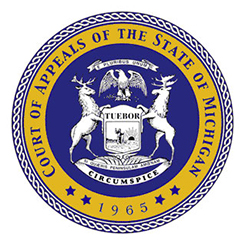In a recent published decision, the Michigan Court of Appeals confirmed that the doctrine of res ipsa loquitur is available to prove a circumstantial case of negligence based on a premises liability theory.

In a recent published decision, the Michigan Court of Appeals confirmed that the doctrine of res ipsa loquitur is available to prove a circumstantial case of negligence based on a premises liability theory.
The plaintiff in Pugno v Blue Harvest Farms, LLC, an air compressor technician, was visiting the defendant’s packaging facility to inspect a malfunctioning compressor.
As he and the defendant’s owner walked through the warehouse, they passed a stack of pallets of unassembled cardboard boxes, which unexpectedly fell on them. The plaintiff suffered a broken hip and required emergency surgery. The pallets and cardboard boxes that fell were not preserved, nor were any photographs taken.
The plaintiff filed a lawsuit alleging ordinary negligence, and later added a claim based on a premises liability theory of negligence. The defendant filed a motion for summary disposition, arguing that the premises liability claim should be dismissed because the plaintiff presented no proof that the defendant had actual or constructive notice of the hazardous condition, and that there was no evidence of negligence because the plaintiff could not explain why the pallets fell. In response, the plaintiff argued that a jury instruction based on the doctrine of res ipsa loquitur was needed for the very reason that there was no evidence as to why the pallets fell. The trial court permitted the case to proceed to trial, and the jury returned a verdict finding the defendant liable on both theories.
On appeal, the Court of Appeals agreed with the defendant that the plaintiff did not allege an ordinary negligence claim, as there was no proof that the plaintiff’s injury was caused by active conduct on the part of the defendant or its employees, such as knocking the pallets over or stacking the pallets at the time they fell. As a result, the trial court erred in permitting the plaintiff to proceed to trial on the ordinary negligence theory.
The Court of Appeals disagreed, however, with the defendant’s contention that the trial court erred in permitting the premises liability claim to survive summary disposition. Specifically, the Court looked to the defendant’s owner’s testimony that a week before the incident he used a forklift to move the pallets and stacked them three bundles high, which was a normal practice in the industry. The Court found that knowledge of the condition was imputed to the defendant by virtue of the fact that its owner admittedly created it, and held that the plaintiff presented sufficient evidence – albeit circumstantial – to prove that the defendant failed to warn and protect the plaintiff from an unreasonable risk of harm.
The defendant additionally argued that the trial court should not have allowed a res ipsa loquitur jury instruction in a premises liability case. The main purpose of the doctrine of res ipsa loquitur – Latin for “the thing speaks for itself” – is to create an inference of negligence when the plaintiff is unable to prove the actual occurrence of a negligent act. The Michigan Supreme Court has held that the doctrine applies under following standard:
- The event must be of a kind which ordinarily does not occur in the absence of negligence;
- It must be caused by an agency or instrumentality within the defendant’s exclusive control;
- It must not have been due to any voluntary action or contribution on the plaintiff’s part; and
- Evidence of the true explanation of the event must be more readily available to the defendant than to the plaintiff.
Significantly, a plaintiff must also produce some evidence of wrongdoing beyond the mere happening of the event.
In determining whether the doctrine of res ipsa loquitur can apply in a premises liability case, the Court of Appeals looked to the Restatement Torts, 2d, which provides examples of when the theory applies, such as “when plaster unexpectedly falls from the ceiling, when a sign falls from a building, or when a chandelier falls from its fixture.” Ultimately, the Court determined that res ipsa loquitur may apply to a premises liability claim because premises liability is a theory of negligence and res ipsa loquitur is a kind of circumstantial evidence case in which the jury may reasonably infer negligence and causation based on the mere occurrence of the event and the defendant’s relation to it.
In the Pugno case, the defendant’s owner testified that he stacked the pallets of cardboard, and that properly stacked pallets should not fall, leading to the reasonable inference that a falling pallet was improperly stacked. In addition, the plaintiff’s expert opined that the defendant’s storage procedures fell below the industry standard. Even more importantly, the Court noted that the defendant failed to preserve the pallets of cardboard that fell, which could have provided an answer as to why they fell. The Court reasoned that the plaintiff was entitled to an inference in his favor due to the spoliation of evidence, and that a jury could reasonably determine that falling pallets is an event that ordinarily does not happen in the absence of negligence and that the improper stacking and storing of pallets was the likely cause of the injury.
The Court of Appeals’ holding in Pugno provides plaintiffs with a possible way to avoid dismissal of premises liability claims even in the absence of proof of a dangerous condition or an explanation of how an injury was caused. Courts may apply res ipsa loquitur as long as an argument can be made that the instrumentality resulting in injury was in the defendant’s exclusive control, that the occurrence of the event is something that would not ordinarily happen in the absence of negligence, and that there was some “wrongdoing” on the part of the defendant.
Landowners should be cautious not to create an inference of negligence by establishing their customary practices only to conclude that an injury would not have occurred were its practices properly followed. Landowners should also be particularly careful to preserve all evidence, in an effort to avoid an adverse inference being drawn due to spoliation of evidence.
For more information, or if you have any questions regarding this topic, please contact any of our insurance defense attorneys.
Dan Jedell focuses his practice on complex tort, no-fault and automobile negligence claims, professional negligence, and commercial litigation matters, both at trial and before appellate courts.


